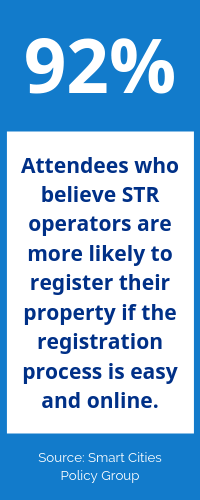
Last week, on a sweltering August day in Austin, Texas, nearly 200 participants gathered to discuss one of the hottest topics facing local governments today: short-term rentals and the opportunities and challenges they present.
Hosted by the Smart City Policy Group, the summit brought together stakeholders across the spectrum of the short-term rental industry, from local government officials, vacation and tourism boards, online rental platform representatives, and owners/hosts of short-term rental properties. Accela was a sponsor of the event and I had the pleasure of participating in
the summit as a subject matter expert on short-term rental registration and licensing.

In opening remarks at the summit, I shared with the audience current trends in regulating short-term rentals – including the impact of ordinances passed recently in Hawaii that mandate short-term rental registration – and examples of cities that are successfully managing short-term rentals through a licensing program.
Communities have struggled with how to regulate short-term rentals – or whether to regulate them at all – because of a complex mix of issues that surround short-term rentals, such as
private property rights, neighborhood impacts, taxation and revenue, and liability concerns. In my remarks, I pointed to three key advantages communities receive as a direct result of regulation:
- Better decisions through better data – Through a strong licensing program, cities have access to a rich set of data on the number of available short-term rental units, density concentrations of rental properties, frequency of rentals, and the impact of short-term rental space on long-term rental housing availability. This data drives policy and local ordinances that address community needs, supported by findings from the data.
- Community empowerment – One of the chief concerns of neighbors adjacent to short-term rental properties is the feeling of powerlessness to address issues, such as noise and nuisance complaints. A registration program provides vital tools for neighbors to directly address concerns. For example, an online lookup tool is available for neighbors to check whether a nearby property has a valid license, and report properties operating without a license. Complaints can be submitted online, putting city resources and enforcement actions to work against non-compliant rental hosts.
- Increased compliance by hosts and guests – A registration program sets the expectation of compliance with all city regulations. Owners who comply with registration requirements are much more likely to comply with any issues surrounding their rentals, such as noise, nuisance, or safety concerns and to set proper expectations for their rental guests. Compliant hosts are critical to promptly resolving issues that can arise from short-term rentals to ensure the best possible experience for all parties involved.
Having easy, online tools for property host registration is a key factor in achieving high host compliance with registration requirements. Accela’s fully-online application, document submission, and payment solution makes it easy for property owners to apply for and receive short-term rental licenses. Property owners are much more likely to comply with registration requirements when the application process can be completed online at their convenience.
For an example of a city using Accela Short-Term Rental Registration to achieve a high host compliance rate and successfully manage more than 2,500 short-term rental units in the city, see our case study on Denver, Colorado.
David Maxwell is a Senior Product Marketing Manager at Accela, focused on solutions that help governments grow businesses and navigate the challenges and opportunities of emerging regulatory areas, such as cannabis, short-term rentals and alcoholic beverage control.






